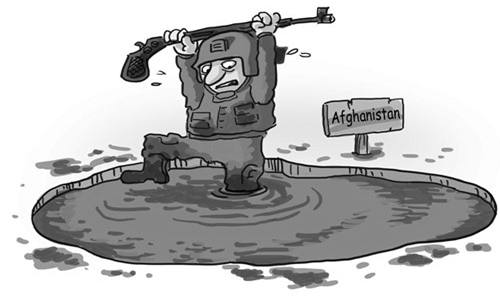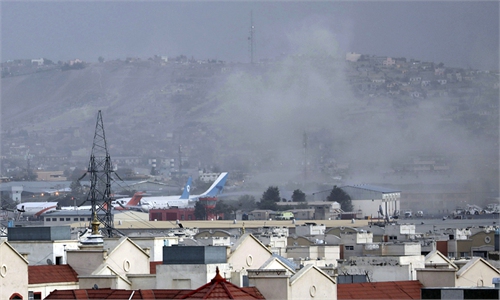
Illustration: Liu Rui/GT
The US debacle in Afghanistan will make lower-ranked officers and soldiers in the US military more suspicious toward whether their senior leaders' strategies are correct when they implement other missions in the future. This will eventually affect the overall combat effectiveness of the US military and impact its completion of combat tasks. This is a pressing problem encountering the US military at the moment.
A Marine Corps spokesperson on Friday was quoted by CNN as saying that US Marine Corps Lt. Col. Stuart Scheller, who served in both Afghanistan and Iraq, has been relieved of his command after he posted a video on Thursday questioning military leaders' handling of the situation in Afghanistan. The video came after the attack in Kabul that killed 13 US service members.
According to CNN, Scheller said in the video he was "willing to throw it all away" to publicly "demand accountability" from the military leadership.
Scheller's dismissal indicates that US military leadership is unwilling to listen to any suggestions or dissatisfaction, nor willing to admit or correct any of their strategic mistakes. Instead, they spare no efforts to shun their responsibility. This will inevitably bring more disasters. It signals that senior leaders attach little significance to the safety of these lower-ranked officers and soldiers, as the latter will continue to face more threats.
Take another example. Brett Crozier, former commander of the USS Theodore Roosevelt aircraft carrier, in late March 2020 wrote a letter to his superiors, pleading with them to take measures to help curb the spread of COVID-19 on his ship and urging senior leaders to evacuate most sailors onboard. But in response, Crozier was relieved of duty, although many Americans see him as a hero.
"The two examples reveal that an increasing number of members in US military have publicly expressed their dissatisfaction toward their leadership. This will gravely hit the morale and the will to fight, as well as impair the image of US military. Top military leaders should have a clear assessment of the situation to ensure their decisions are smart and correct, instead of putting their soldiers and lower-ranked officers into missions which will eventually prove to be stupid. Senior leaders should avoid the soldiers and officers dying for nothing," Li Haidong, a professor at the Institute of International Relations of the China Foreign Affairs University, told the Global Times.
The US' failure in Afghanistan is mainly the responsibility of the top US military leaders. This is a result combined misjudgment of policymakers and a failure of coordination among departments of defense, intelligence and foreign affairs, rather than the responsibility of lower-ranked officers and soldiers, who are just conducting their missions. But actually, they are paying the price of the misjudgment of top leaders, facing the possibility of being killed at any time. This will result in their low morale in carrying out the mission. In the battlefield, they concerned more about how to go away from the battle as soon as possible, rather than share a bitter hatred of the enemy and fight bravely.
The US debacle in Afghanistan will make more US soldiers and lower-ranked officers realize the folly of the military leadership. As a matter of fact, whatever the senior leaders determine, it depends on soldiers and lower-ranked officers to implement.
"If those carrying out the decisions question the judgment from the military leadership, they will be dissent about their mission, and will be reluctant to work hard and struggle to the very end," Li said. This will embarrass the US military.

